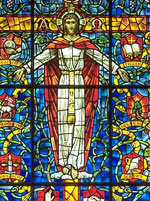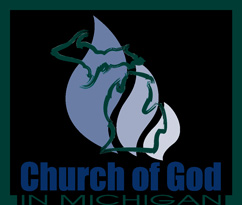The gospel, the good news about Jesus, belongs to God – not to Paul, nor to any other preacher. Listen to Pastor David’s message based on 1 Thessalonians 2:1-12.
The gospel, the good news about Jesus, belongs to God – not to Paul, nor to any other preacher. Listen to Pastor David’s message based on 1 Thessalonians 2:1-12.
The Church of God has always supported women as ministers of the good news of Jesus Christ, based on our reading of scripture passages such as Romans 10:5-15. Listen as Pastor David sets the context and discusses how all of us are responsible to take in the word of faith and to share it with others. How beautiful are the feet of those who bring good news!
Last month, I had the privilege of gathering with about 60 other pastors from Michigan at our annual Pastors’ Institute. At this retreat for ministers in the Church of God, we learn from a guest speaker, we relax and play games together, and we share in times of worship as a community of faith. It is refreshing, in many ways, for pastors like me simply to be part of a worship service in which we have no responsibilities – other than to worship Jesus, which is always the responsibility of all of us. Continue reading
Do you remember She-Ra? She was a fictional cartoon character created in the 1980s to counterbalance another character called He-Man. (They are related very similarly to how Luke Skywalker and Leia Organa are related, if that helps.) She-Ra was known for her immense strength and for her incredible intelligence; often she defeated her enemies with quick wits rather than aggressive action. She-Ra was known as the “Princess of Power” and “The Most Powerful Woman in the Universe.” Not bad, right?
He had a daughter named Sheerah. She built the towns of Lower and Upper Beth-horon and Uzzen-sheerah. (1 Chronicles 7:24 NLT)
Today’s Chronological Bible reading includes this one verse which, like many others, is easy to glance over and ignore. But perhaps we should pause to reflect on it! Continue reading

This past month was “Pastor Appreciation Month,” and I have to admit: I feel very appreciated! Thank you to all of you who sent cards, gave gifts, wrote notes, and participated in last Sunday’s potluck dinner after church. None of those expressions of appreciation are required; they are all “bonus blessings” from my perspective. I feel confident in speaking on behalf of Pastor Jerry when I say that we are both deeply grateful and appreciative of you, the good people of Mt. Haley Church of God.
As this month draws to a close, I think it is proper to turn things around. Another way to read “Pastor Appreciation Month” is to ask the question, “For what is your pastor appreciative?” So here is a short summary of a few reasons that I am grateful to be your pastor:
Take a few minutes to read the first eleven verses of Philippians. Those are the words Paul wrote to his beloved congregation in Philippi. I think they speak very well of my appreciation for Mt. Haley Church of God, as well!
–Pastor David
Last October, I reported to you that the Credentials Committee of the Church of God in Michigan had approved me for ordination. I was indeed ordained at the state’s General Assembly meeting in November, and now we are in the midst of planning for my formal ordination service at Mt. Haley on May 25, one month from today. Through a couple of conversations, it became apparent to me that it might be helpful for you to know exactly what this process has entailed and what it means for my ministry.

The Church of God ordains pastors on a state-by-state basis. I began the ordination process in 2007 while I was in seminary in Indiana. I met with Indiana’s Credentials Committee twice, took a Bible content exam, and began reading a selection of required books. This was in addition to my seminary reading list: over five years, I took ninety hours of graduate courses to earn a Master of Divinity degree. Also, as part of the ordination process, I wrote and defended fourteen theological statements (which are available on our website, if you’re interested to read them). All of this preparation was to ensure that I am theologically sound and at least somewhat prepared to enter a ministry position.
During this time, I moved through the first two phases of the ordination process. In Indiana and Michigan (and most states), the Church of God classifies ministers as “commissioned,” “licensed,” and finally “ordained,” in increasing order of call, trust, and responsibility. At the beginning of my process, I was “commissioned” in Indiana; that was a recognition of the fact that I sensed a call to enter ministry – and that it seemed right to the committee as well. After I completed the work listed in the previous paragraph, I became “licensed.” This allowed the world to consider me a minister from a legal perspective: I could perform wedding ceremonies and file taxes as a minister. For all intents and purposes, a licensed minister can do anything you’d expect a fully ordained minister to do.
All of this happened in Indiana. Then, when Mt. Haley called me to become its senior pastor and Tara and I moved to Michigan, my ministerial credentials were transferred to the Church of God in Michigan. Since that time, I have met with Michigan’s Credentials Committee twice so they could review my theological statements, get to know my call to ministry, and prepare me for full ordination.
Another part of that preparation is a relationship with a “supervising mentor.” Rev. Dr. Kevin Earley, pastor of the Metropolitan Church of God in Detroit, was assigned to serve in this role for me. We were acquaintances from seminary – he earned his doctorate while I worked on my master’s – and in the past year we have had a handful of phone conversations about pastoral ministry, its challenges, and its opportunities.

Another component is a document called a “Life and Ministry Plan,” which is like a personal mission statement for pastors. This “LAMP” is a living, growing document that is to inform and adapt to my life and ministry over the course of my life. This requirement was waived in my case because I am currently working on my “LAMP” with my “SHAPE” group (“Sustaining Health And Pastoral Excellence”), a group of five pastors who meet each month for connection, support, and mutual growth. (My “LAMP” should be completed sometime this year.)
All of this culminated in the Credentials Committee’s recommendation that I be presented for ordination at the state General Assembly meeting last November. At that meeting, four other candidates and I were presented to the assembly. We each gave a three-minute testimony/summary of our call to ministry, and then the gathered ministers and church representatives voted whether or not to ordain each of us. The rules state that if six “no” votes are received for any candidate, then his or her ordination is withheld for further consideration. That did not happen in my case, so my ordination was technically approved in November.
What remains is a formal ordination service, which we have scheduled for May 25. At this service I will be given my official certificate of ordination, and the whole process will finally be complete.
Ordination is a call to ministry in the church. If I were not serving in an official ministry position, I could not be ordained. And in the future if I should not have a ministry position for a significant length of time, my ordination credentials could be revoked. Ordination means that I am fully recognized as a minister in the Church of God, but it also means that I am fully accountable as a minister in the Church of God. I am welcome to serve as pastor, but I am not free to do whatever I wish. I am trusted to serve the church well, but I must not abuse that trust. I have the support of the Church of God movement behind me, but that is not license for me to go astray from what God intends for my life and ministry.
The Bible is full of examples of priests and Levites who were called to serve God. Many of them served faithfully for their whole lives, while others went astray and were censured by God and by the faith community. I intend to be found in the “faithful” group when the final tally is counted.
If you have any questions about the ordination process or what it means for me or for Mt. Haley, please feel free to ask me!
–Pastor David
This is, perhaps, a bit belated, but I want to express my heartfelt thanks to all of you in the congregation for your kind outpouring of gifts, cards, chocolates (especially those!), and warm wishes during the recent Christmas season. It is an honor to serve as your pastor, and Tara and I appreciated reading each card, reflecting on each family, and giving thanks for such a group of people with whom we have the privilege of working. So thank you, one and all, for your many thoughtful gifts in the past month or so.

The letter known as James, written so many years ago, communicates relevant truths about gift-giving that can be useful for all of us in such a time as this. In the early verses of this short letter, the author encourages Christians to remain faithful to the Lord even in times of testing. Of course, the earliest Christians – along with some Christians in certain parts of today’s world – faced much more serious persecutions and trials than we experience in contemporary Western culture. Yet the first gift that James mentions as being worthy of requesting from God is the same gift for which King Solomon yearned in the Old Testament days: the gift of wisdom. (See James 1:5.)
Oh, that we might all be wise in our living! I ask the Lord frequently for wisdom in my service as your pastor; I hope that you ask God for wisdom frequently in your daily vocations, as well. As generously as Mt. Haley showered Tara and me with Christmas gifts and cards last month, so much more generously will our God shower wisdom on those who ask him for it sincerely and in faith.
For as James teaches us, “All generous giving and every perfect gift is from above, coming down from the Father of lights, with whom there is no variation or the slightest hint of change” (James 1:17 NET). How comforting to know that God’s character never changes: that he is always generous, giving, and forgiving; that he is steadfast, consistent, and just. The new life he has planted in us through Jesus Christ (see James 1:18) is perhaps the greatest gift God has given us, although it requires (and inspires) us to strive toward holiness and righteousness on an everyday basis.
God’s gift of life-changing wisdom causes the faithful to desire to live differently in ways that please the Giver. In the same way, those who receive gifts from fellow human beings strive to honor their relationships so that the gifts do not fall empty and become meaningless. Have you ever received a gift from someone and then worked diligently to strengthen that relationship because of that gift? So should it be with our relationship with the Lord, in response to his gift of wisdom.
And so it will be in my relationship with you as Pastor of Mt. Haley Church of God. In the new year, I pledge to renew my efforts to lead this congregation in ways that please God, the giver of all good and perfect gifts. To God be the glory in 2013!
–Pastor David
Yesterday, I met with the credentials committee of the Church of God in Michigan. This second interview was intended to determine whether or not the committee will recommend me for ordination at this November’s state General Assembly meeting in Lansing. I received word last night that they, in fact, are recommending me for ordination, so this will indeed take place on Saturday morning, November 10.
 This is a great honor for me, to be brought into the larger fold of pastors and ministers in the Church of God and in the Christian movement in general. This comes as the culmination of a long process that began, for me, while I was in seminary in Indiana. The process involved reading several books, taking a Bible content exam, writing theological statements on fourteen different topics, defending those statements in front of the credentials committee, and meeting with a mentoring pastor. Also, in the next several months I will complete a LAMP (“Life and Ministry Plan”) with the help of my SHAPE (“Sustaining Health and Pastoral Excellence”) group – a group of five local Church of God pastors that meets monthly for support, encouragement, and growth.
This is a great honor for me, to be brought into the larger fold of pastors and ministers in the Church of God and in the Christian movement in general. This comes as the culmination of a long process that began, for me, while I was in seminary in Indiana. The process involved reading several books, taking a Bible content exam, writing theological statements on fourteen different topics, defending those statements in front of the credentials committee, and meeting with a mentoring pastor. Also, in the next several months I will complete a LAMP (“Life and Ministry Plan”) with the help of my SHAPE (“Sustaining Health and Pastoral Excellence”) group – a group of five local Church of God pastors that meets monthly for support, encouragement, and growth.
These tasks only have meaning, however, because of the ministry that I am privileged to do with you at Mt. Haley Church of God. It is because of this relationship between pastor and church that I do all these things – that I even pursue ordination. The ordination of a pastor is not a rite of passage that simply makes the pastor look or feel good; it is a process that strengthens the pastor’s call, encourages him or her in the work of ministry, and validates the ministry of the local church in which he or she serves. I will be honored to serve Mt. Haley Church of God as an ordained minister starting on Sunday, November 11.
We will host a special ordination service at Mt. Haley sometime after this November’s General Assembly meeting. There is no rush for this; we may wait until our snowbirds return in the spring. Just as we celebrated my installation as pastor at Mt. Haley two years ago, I will be grateful to celebrate with you my ordination as a minister in the Church of God sometime in the near future.
in Christ’s service,
–Pastor David
When I was a teenager, I spent a good deal of time and energy playing chess. I developed a love for the game in childhood, but I never played “competitively” until middle school. I remember that my first experience with a chess tournament resulted in a record of one win and four losses – not the most auspicious of beginnings to a chess career.
For some reason, I chose to devote myself to this game rather than to band, choir, 4-H, or other activities like those chosen by most of my friends at school. Through a process of weekly practice sessions, tournaments through the school year, and individual study on my own, I developed into a pretty decent chess player. I never won 1st place in an official tournament as an individual, but I often placed in the top ten and helped our team to do well from time to time. The “crowning achievement” of my chess career was helping my school win the Indiana state team chess championship in my junior year of high school – a story so full of drama and tension that it would make for a good movie. (At least, I would watch it!)
The need for discipline is a fact of life. Discipline is required for any task at which we want to excel, whether it be a game like chess, a career or trade, a relationship with a spouse, or even a relationship with Christ. It seems that we are quick to agree to training for a job or something “enjoyable,” while we are frequently hesitant to train for excellence in our relationships. Why is this so?
In 1 Corinthians 9:24-27 (NIV), Paul encourages us to “run in such a way as to get the prize.” Of course, he is not writing about a literal footrace but rather about our walk of public discipleship. Sharing Christ with those around us is so important that we should summon up all our energy for the task. But any runner (distance or sprint) will tell you that you can’t just run and win the race. You must train and train and train in order to be able to compete. In fact, you will spend more time in preparation than you will actually racing.
Paul continues, “I beat my body and make it my slave so that after I have preached to others, I myself will not be disqualified for the prize.”
Following Christ with our lives is hard work! We must be dedicated to disciplines that will help us run the race: prayer, Bible study, regular worship, fellowship with the saints, confession of sins to God, and so forth. Are you engaged in these types of spiritual disciplines? A better question: are you excited about engaging in them? I believe we could all stand to be more like aspiring high school chess players in our spiritual lives.
So, today I’d like to let you in on a little secret: I’m losing my hair. That probably comes as no surprise to you, especially if you’ve seen me in person lately. And it’s no surprise to me – my barber told me about my thinning hair when I was sixteen years old. But it’s on my mind again this week. I call my receding hairline “The Retreat of the Soldiers.”